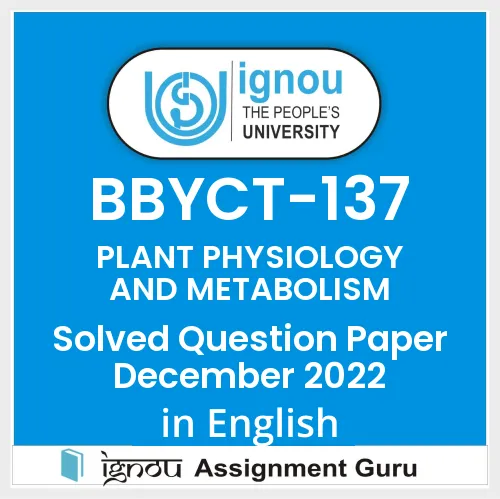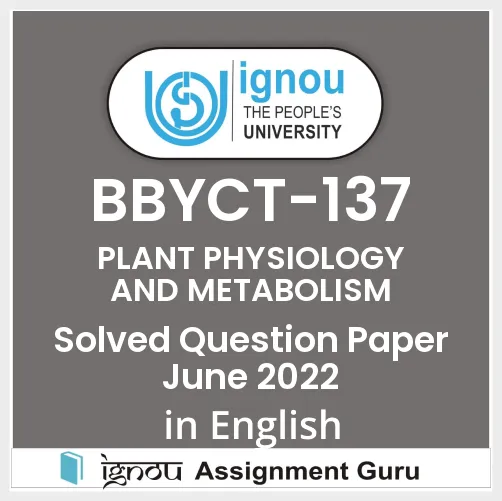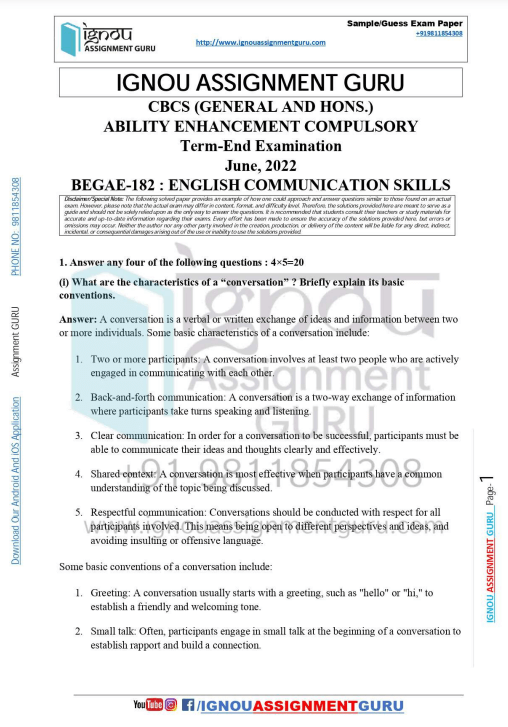- Your cart is empty
- Continue Shopping
BBYCT-137 PLANT PHYSIOLOGY AND METABOLISM in English Solved Question Paper June 2022
₹20.00Current price is: ₹20.00. Original price was: ₹100.00.
BBYCT-137 PLANT PHYSIOLOGY AND METABOLISM
in English Solved Question Paper June 2022
PLANT PHYSIOLOGY AND METABOLISM
Course Code: BBYCT-137
BBYCT-137 PLANT PHYSIOLOGY AND METABOLISM in English Solved Question Paper June 2022
PLANT PHYSIOLOGY AND METABOLISM
Course Code: BBYCT-137
| Title Name | BBYCT-137 Solved Question Paper June 2022 |
| University | IGNOU |
| Service Type | Solved Question Paper (Soft copy/PDF) |
| Course | BSCG |
| Language | English |
| Year | June 2022 |
| Course Code | BBYCT-137 |
| Product | Solved Question Paper (IGNOU) |
1. (a) State whether the following statements are
true or false :
(i) The stomatal index is constant for a
species and is used as a good
taxonomic character.
(ii) Turgor pressure of a flaccid cell will
be 1.
(iii) Sugars are transported via both
apoplastic and symplastic routes.
(iv) Glycolysis can continue even when
the supply of NAD+ is limited.
(b) Fill in the blanks :
(i) Water deficit leads to the __________
of the stomata in day time.
(ii) A short day plant requires more than
a critical period of _________ .
(iii) The most preferred element which is
translocated by apoplastic pathway is
____________ .
(c) Define the following terms :
(i) Exosmosis
(ii) Hygroscopic water
(iii) Guttation
(iv) Field capacity
(v) Leghemoglobin
2. Describe Calvin–Benson cycle with a labelled
schematic diagram indicating the sites of ATP
and NADPH consumption. 10
3. (a) Describe the three functions of essential
elements. 3
(b) List any four macronutrients and describe
how the deficiency of any two of these
macronutrients affects the plant growth. 2+5
4. How were gibberellins discovered ? Discuss its
bioassays and functions. 10
5. Describe the reactions of TCA cycle indicating
the enzymes involved and the sites of ATP
synthesis with labelled schematic diagram. 10
6. (a) Discuss phytochrome mediated responses. 5
(b) Define vernalization and discuss its
mechanism of action. 5
7. (a) Discuss the significance of transpiration.
Describe the mechanism of stomata opening
and closing with proper diagram. 5
(b) What is stress ? Discuss various ways
adopted by plants to reduce pollutant stress. 5
8. Write short notes on any two of the
following :
(a) Abscisic acid
(b) Gifted species
(c) Allosteric enzymes
(d) Agricultural biotechnology










Reviews
There are no reviews yet.